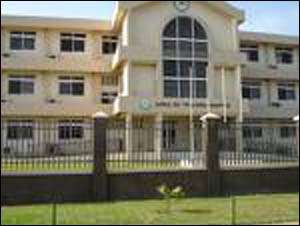
Korle Bu Teaching Hospital MANAGEMENT OF the Korle Bu Teaching Hospital (KBTH) has stated that it may have to deny beneficiaries of the National Health Insurance Scheme (NHIS) access to healthcare if authorities of the scheme do not clear all outstanding claims it owes the facility.
According to Prof. Nii Otu Nartey, Chief Executive Officer of the KBTH, claims yet to be paid amount to GH¢1,702,438.42, representing 30 percent of the total quotation of GH¢5,635,829.98.
This value is an accumulation of services rendered under the scheme from 2006 to 2008.
Addressing the Annual Performance Review in Accra yesterday, he noted that out of the total value used to render services to clients of the scheme, GH¢3,933,391.56 was reported to have been paid to the hospital whereas the outstanding debt is still hanging.
However, the rather worrying signals being sent by management, was as a result of a recent letter it received from the Acting Director of the Ministry of Health (MOH).
“We have received a letter from the Ministry of Health, warning us that if we have not paid what is owed to the Tema Medical Stores by the middle of March, they would not give us any consumables on credit,” Prof. Nartey disclosed.
According to him, “this means we may also have to stop giving credit to the National Health Insurance Scheme.”
The Chief Administrator of KBTH was of the view that if services were rendered within four weeks, it should be paid within that stipulated time and not otherwise, pointing out that if such instances persist, “we would not have any money to run this hospital.”
Admitting the laudability of the NHIS project, he said that the “delay in reimbursement is affecting the operations of the hospital.”
He also explained that the “free maternal care has increased the number of deliveries at Korle Bu, thereby reducing its effectiveness in handling complicated deliveries that needs specialist care.”
Prof. Nartey stated further that private clinics, whose provision of the scheme does not meet their standards, had even received their payments, leaving the government health delivery institutions to perish.
He condemned the process used to disburse funds for service providers; describing the whole system as bureaucratic.
His words suggested that if one does not push money into facilitating the process, then disbursements for one's outfit would be delayed. But “we have no money to give bribes that is why ours have not been paid,” Prof. Nartey said.
Meanwhile, NHIS attendance in the infirmary rose to a high of 132,934 in 2008, which represented 41 percent while 2007 also saw an upward adjustment of 64,000 over year 2006, which recorded 15,000 and represented five percent.
Focusing on what to achieve this year, Prof. Nartey mentioned that his outfit would reorganize its services and improve the quality of patient care; expand, modernise and rehabilitate physical structures and also replace obsolete equipment.
It is also poised to put in place programmes, aimed at attracting and retaining the required number of staff as means of ensuring quality care delivery among others.
He called on staff to support management in its quest to modernize the teaching hospital. By Nathaniel Y. Yankson




 We’ll no longer tolerate your empty, unwarranted attacks – TUC blasts Prof Adei
We’ll no longer tolerate your empty, unwarranted attacks – TUC blasts Prof Adei
 Bawumia donates GHc200,000 to support Madina fire victims
Bawumia donates GHc200,000 to support Madina fire victims
 IMF to disburse US$360million third tranche to Ghana without creditors MoU
IMF to disburse US$360million third tranche to Ghana without creditors MoU
 Truck owner share insights into train collision incident
Truck owner share insights into train collision incident
 Paramount chief of Bassare Traditional Area passes on
Paramount chief of Bassare Traditional Area passes on
 Two teachers in court over alleged illegal possession of BECE papers
Two teachers in court over alleged illegal possession of BECE papers
 Sunyani: Victim allegedly shot by traditional warriors appeals for justice
Sunyani: Victim allegedly shot by traditional warriors appeals for justice
 Mahama vows to scrap teacher licensure exams, review Free SHS policy
Mahama vows to scrap teacher licensure exams, review Free SHS policy
 Government will replace burnt Madina shops with a new three-story, 120-store fac...
Government will replace burnt Madina shops with a new three-story, 120-store fac...
